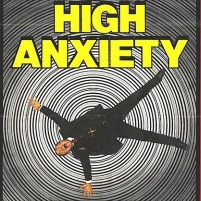Drug Companies Increase Profits by Creating Fear of Diseases (and Even Diseases)
Tuesday, December 13, 2011
 (movie by Mel Brooks)
(movie by Mel Brooks)
Coined nearly 20 years ago, the term “disease mongering” is still applicable today for what the pharmaceutical industry is doing to promote its blockbuster drugs among America’s “sick.”
In her book Disease-Mongers: How Doctors, Drug Companies, and Insurers Are Making You Feel Sick, Lynn Payer described several disease-mongering tactics including 1) taking a normal function and implying that it is potentially dangerous and should be treated, preferably for a long time; 2) taking a common symptom that could mean anything and making it sound as if it is a sign of a serious disease; 3) saying that a large percentage of the population might be suffering from the “disease” and 4) recruiting doctors to spread the message.
Dr. Andrew Weil has highlighted another tactic: attaching “polysyllabic, clinical-sounding names to what used to be seen as trivial or transient conditions.” For example, “Occasional heartburn becomes ‘gastro-esophageal reflux disease’ or GERD; premenstrual tension becomes ‘premenstrual dysphoric disorder’ or PMDD; and shyness becomes ‘social anxiety disorder’ or SAD.”
Barbara Mintzer of the University of British Columbia has enumerated various tactics used by pharmaceutical companies to increase sales, such as 1) “Promotion of drugs as a first-line solution for problems previously not considered medical, such as disruptive classroom behavior… 2) promotion of anxiety about future ill-health in healthy individuals; and 3) introduction of questionable new diagnoses—such as PMDD or social anxiety disorder—that are hard to distinguish from normal life.”
Aggressive and creative marketing has permitted drug manufacturers to convince millions of people they have a problem that requires treatment and medication. Depression has been the poster child of this successful selling of ailments, and served as a catchall diagnosis for everything from sadness to anger to fear to remorse.
But like any trend that has marketing to thank for its existence, depression became passé. So nowadays the big drug companies have been telling as many people as possible that they have adult ADHD (Attention Deficit Hyperactivity Disorder). The industry even took out billboards to spread the news of the disease by lighting up Times Square with questions for consumers about lack of focus and over-agitation.
These and other messages helped skyrocket the number of ADHD cases, which have doubled and even tripled among important age groups (20 to 44 and 45 to 65).
Sometimes, the therapy being pushed can be more harmful than the condition it’s supposed to treat. Rheumatoid arthritis is another diagnosis that drug makers have sought to exploit, with immune suppressors such as Remicade, Enbrel, and Humira. Taking these, however, can “invite cancers, lethal infections, and activate TB [tuberculosis],” writes Martha Rosenberg at AlterNet.
Disease mongering also has led to “invented” disorders, like female sexual dysfunction. Thanks to the drug industry, as many as two-thirds of women think they have this problem.
Pfizer, the manufacturer that brought Viagra into the world, spent lavishly on research to come up with a “female equivalent” of its billion-dollar moneymaker. But it hasn’t found a miracle molecule yet.
In the meantime, Pfizer tried pushing Viagra on women, claiming it might just work for them too. But it gave up after studies showed it was no more effective than a placebo.
Another disease popular with drug companies is fibromyalgia, an exploitable syndrome characterized by chronic, widespread pain. Both Pfizer and Eli Lilly have pushed drugs to counter the syndrome and have carried out campaigns to encourage doctors to diagnose it and prescribe drugs for treatment.
-David Wallechinsky
Seven Diseases Big Pharma Hopes You Get in 2012 (by Martha Rosenberg, AlterNet)
Female Sexual Dysfunction 'Was Invented by Drugs Industry' (by Jeremy Laurance, The Independent)
Creating Disease: Big Pharma and Disease Mongering (by Larry Dossey, Huffington Post)
Disease Mongering: Good For Big Pharma, Bad For You (by Andrew Weil, Huffington Post)
PloS Medicine April 2006: Special Issue on Disease Mongering (pdf)
- Top Stories
- Unusual News
- Where is the Money Going?
- Controversies
- U.S. and the World
- Appointments and Resignations
- Latest News
- Musk and Trump Fire Members of Congress
- Trump Calls for Violent Street Demonstrations Against Himself
- Trump Changes Name of Republican Party
- The 2024 Election By the Numbers
- Bashar al-Assad—The Fall of a Rabid AntiSemite






Comments